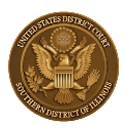Central Violations Bureau (CVB) Scam
Important Notice for Individuals Attempting to Pay a U.S. District Court Violation Notice On-line: A fake website is currently impersonating www.cvb.uscourts.gov and may attempt to collect personal or financial information fraudulently. The only official website for paying a U.S. District Court Violation Notice is www.cvb.uscourts.gov. If you are paying online, please verify the web address carefully and report suspicious activity to the Central Violations Bureau (CVB) at 800-827-2982 or info@cvb.uscourts.gov. Alternatively, you may pay a ticket over the phone by calling the CVB at the same number.
Fraudulent Calls Impersonating Court Officials
The U.S. District Court has received reports that members of the public are being contacted by individuals falsely identifying themselves as court investigators. In these fraudulent calls, the recipients are told they are subjects of a sex trafficking investigation. The callers then attempt to coerce the individuals into making a payment to avoid further legal action.
The scammers have also been spoofing the Court’s main telephone number, making the call appear legitimate on caller ID. These calls are not from the Court or any legitimate government agency.
Please be aware:
- The Court will NEVER contact individuals by phone to demand payment or threaten arrest.
- The Court does not conduct investigations or accept payments related to criminal allegations over the phone.
- Court officials will never ask for confidential personal or financial information in this manner.
If you receive a suspicious call:
- Do not provide any personal or financial information.
- Do not engage with or call back the number.
- Report the incident to local law enforcement and the Federal Trade Commission (FTC) at https://reportfraud.ftc.gov.
For questions or to verify any court-related communications that come via phone, it is perfectly acceptable to ask the caller for their name, then call the Clerk’s Office at (618) 482-9371, and ask for that individual to continue the conversation.
Bankruptcy Fraud Scam
Individuals in financial distress are common targets for scammers. A scam operator calling itself the “Bankruptcy Fraud Watchdog Group” has recently set its sights on consumer debtors, sending letters falsely accusing debtors of failing to disclose assets in their bankruptcy cases. These letters threaten referrals to “the United States Bankruptcy Trustee” for fraud unless the debtors promptly pay “a one-time amnesty fine” of $450 in Bitcoin via a QR code to avoid “further legal consequences.” They also falsely state that debtors who share the letters with their attorneys will face “immediate referral for criminal prosecution.”
If you are a debtor in this district and receive such a letter, please contact the Bankruptcy Administrator's office at (618) 482-9400.
Jury Duty Scam
In various parts of the United States, citizens are being targeted by phone calls and threatened with prosecution for failing to comply with jury service in federal or state courts. The Clerk’s Office has been alerted that citizens are receiving phone calls instructing them to call the county sheriff’s office, using a fictious telephone number. In the calls, the threat of a fine for failure to appear for jury service is used to coerce citizens into paying a fine and providing confidential data, potentially leading to identity theft and fraud. These calls are not from real court officials. The District Court will NEVER ask for payment for failure to appear for jury service. You will NEVER receive an appearance bond for failure to appear for jury service. If you receive a suspicious notice by mail or phone call, please call our Jury Department at (618) 482-9160.
Click here for additional information regarding jury duty scams.
Notice of Electronic Filing (NEF) Scam
There has been nationwide reporting of fake Notices of Electronic Filing (NEFs) being sent to attorneys and law firms across the country. These fake NEFs are phishing attempts to convince recipients to respond back to the emails. Once a recipient replies to the email, they are sent a follow-on email containing a link to access a document that leads the user to a malicious website.
Attorneys and case participants should take caution if they receive these fake NEFs. Please validate cases and case documentation through CM/ECF only, and not to download any attachments or click any links from unofficial or questionable sources.
Click here for additional information regarding NEF scams and spam.
